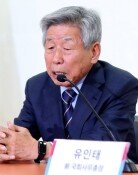Relinking the severed Gyeongwon Railroad ceases
Relinking the severed Gyeongwon Railroad ceases
Posted June. 17, 2016 07:19,
Updated June. 17, 2016 07:34
It was confirmed that the government has tentatively stopped the reconnecting project of Gyeongwon Railroad (linking Yongsan in Seoul and Wonsan in Gangwon Province, North Korea), which had been severed for seven decades. The relinking the severed railway was one of the core projects in “Eurasia initiatives” that President Park Geun-hye has upheld since her early tenure.
Multiple sources in the ruling camp said on Thursday that the Ministry of Unification sent the Ministry of Land, Infrastructure and Transport an official letter that said to stop the reconnection project. The land ministry is said to have directed companies involved in the relinking construction, such as Hyundai Engineering & Construction, to begin the needed work to withdraw workforce and equipment from the construction site by the end of this month.
The government had carried out the first stage of reconnection work at the southern section (9.3 kilometers from Baengmagoji Station to Woljeongni Station). The 2.4 kilometer section after Woljeongni Station to the Military Demarcation Line (MDL) is demilitarized zone and the government had planned to restore this section through mutual agreement, when the mood of reconciliation is created between Seoul and Pyongyang.
“When the Gyeongwon Line is reconnected, piercing whistle that announces the march of Eurasia Initiative would be heard in the Korean Peninsula and neighboring continent,” President Park said at the ground-breaking ceremony held in Cheorwon, Gangwon Province in August 2015.
“It is not that the relinking project stopped, but the construction schedule has been just adjusted since the land compensation cost has increased more than expected,” the Ministry of Unification explained. It added that any changes of project cost larger than 50 billion Korean won (approx. 42.46 million U.S. dollars) should go through the mutual discussion with the Ministry of Strategy and Finance.
“As the price of land area needed for the reconnection project has risen triple times from appraised value of 9 billion won (approx. 7.6 million dollars) to 27 billion won (approx. 22.8 million dollars), the budget and schedule have to be inevitably adjusted,” sources from the unification ministry said. “The unstable situation in forward area after anti-Pyongyang loudspeaker broadcast was resumed due to North Korea’s 4th nuclear test was also taken into consideration.”
However, many see that this is just an ostensible reason. When the reconnection began last year, the concept of “fast track” was applied, exempting preliminary feasibility test and concurrently putting forward with design and construction so as to complete the entire project within the tenure of Park Geun-hye administration. Under the circumstances, some analyze that the government now sees lower possibility for the resumption of inter-Korean cooperation within President Park’s term and its willingness for the relinking project has also decreased.
On the surface, this is a temporary suspension of construction but it’s unclear when the project will begin again. Even though the project resumes, it would be impossible to complete the reconnection by November 2017 as initially planned.
“This could be a signal to Pyongyang that Seoul would not give any room for dialogue by seizing the unification project that had only taken place in part of South Korea. The Eurasia Initiative of President Park may, in fact, be abolished,” sources from the ruling camp said.
홍수영기자 gaea@donga.com · 윤완준기자 zeitung@donga.com







